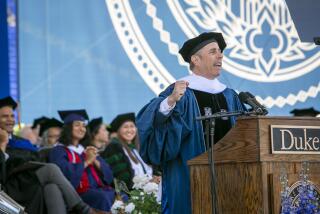George Saunders’ Syracuse commencement address to become book
From the department of it had to happen: The commencement address George Saunders delivered this past spring at Syracuse University, which has gone viral across the Internet, will be published next year as a book by Random House. The title? “Congratulations, by the Way.”
The repurposed graduation speech, of course, has become a staple of contemporary culture: I think of David Foster Wallace’s “This is Water,” given at Kenyon College in 2005 and released in book form after the author’s 2008 suicide, or Neil Gaiman’s “Make Good Art,” presented at Philadelphia’s University of the Arts, which came out in hardcover earlier this year.
Saunders’ address is very much in their model: Witty, offhanded and yet offering nuggets of hard-earned wisdom, advice on how to live. Much like Wallace, he begins by deconstructing the genre of commencement speeches: “Down through the ages, a traditional form has evolved for this type of speech, which is: Some old fart, his best years behind him, who, over the course of his life, has made a series of dreadful mistakes (that would be me), gives heartfelt advice to a group of shining, energetic young people, with all of their best years ahead of them (that would be you).”
But really, that’s just an icebreaker, a way to get at the meat of what he wants to talk about, which is the defining, and inescapable, subject of regret.
Saunders builds his speech around the memory of a girl in his seventh-grade class, an outcast who he didn’t defend (or befriend) strenuously enough. He wasn’t mean to her, but he wasn’t particularly compassionate either, and 40-plus years later, this is what rankles still.
“So here’s something I know to be true,” he acknowledged, “although it’s a little corny, and don’t quite know what to do with it: “What I regret most in my life are failures of kindness.”
As to why this resonates ... well, we’ve all been there, whether (like Saunders) in small ways or something more. For me, it’s the girl in high school I blew off in spectacularly dismissive fashion, sending a long letter, full of quotes from songs and literary allusions, about why I could never go out with her.
I’m filled with shame even as I write about this, as I am whenever I think of it. Talk about a failure of kindness, an inability to see things from another perspective, to understand that we are all flawed and futile human beings, trying to find a place for ourselves, trying to figure out a way to get along.
This is the center of Saunders’ commencement speech, this idea that we must work to “err in the direction of kindness,” that we must always remember that we are in this thing, this life, together, that we should help each other when we can.
“Do those things that incline you toward the big questions,” he told the graduates, “and avoid the things that would reduce you and make you trivial. That luminous part of you that exists beyond personality -- your soul, if you will -- is as bright and shining as any that has ever been. Bright as Shakespeare’s, bright as Gandhi’s, bright as Mother Theresa’s. Clear away everything that keeps you separate from this secret luminous place. Believe it exists, come to know it better, nurture it, share its fruits tirelessly.”
ALSO:
George Saunders goes digital with ‘Fox 8’ e-book
George Saunders, Hilary Mantel among Time’s 100 most influential
‘Tenth of December’ by George Saunders is accessible but with deeper layers underneath
More to Read
Sign up for our Book Club newsletter
Get the latest news, events and more from the Los Angeles Times Book Club, and help us get L.A. reading and talking.
You may occasionally receive promotional content from the Los Angeles Times.







